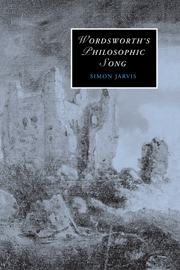Introduction: poetic thinking
Published online by Cambridge University Press: 22 September 2009
Summary
When Wordsworth is trying to get started on his projected long poem, ‘The Recluse’, he reviews the fantasies of major poetic achievements which he has at various times entertained. The catalogue culminates in this:
Then, last wish,
My last and favourite aspiration! then
I yearn towards some philosophic Song
Of Truth that cherishes our daily life;
With meditations passionate from deep
Recesses in man's heart, immortal verse
Thoughtfully fitted to the Orphean lyre;
But from this awful burthen I full soon
Take refuge, and beguile myself with trust
That mellower years will bring a riper mind
And clearer insight.
(i. 229–39)
How important, and in what ways, was this ‘favourite aspiration’ to what Wordsworth actually did in the end write? For one of the most illuminating among recent readings of Wordsworth, it was not very important at all. Or rather: not only was it important only in so far as it was harmful, but it was not even fully Wordsworth's own aspiration:
Coleridge wanted to believe for reasons of his own, and he persuaded Wordsworth also to believe, that a young poet's gradual development toward self-consciousness was his major theme, and that its truth for morals was gratitude to nature for having made him what he was. With that description of the poet's work came the burden of a special project, of which Wordsworth was the destined executor – a theodicy, both metaphysical and historical in scope, whose leading evidences would come from the receptive and infinitely associable mind of the poet. … But his friend's ambitions were mismatched to his own talents. When you have disposed of the philosophy of The Prelude, you have not disposed of Wordsworth but only of a notion someone once had of him, which he unfortunately came to share. The long poem he withheld for most of his life is a record of accidents, to which the author hoped to give coherence.
- Type
- Chapter
- Information
- Wordsworth's Philosophic Song , pp. 1 - 32Publisher: Cambridge University PressPrint publication year: 2006
- 1
- Cited by



